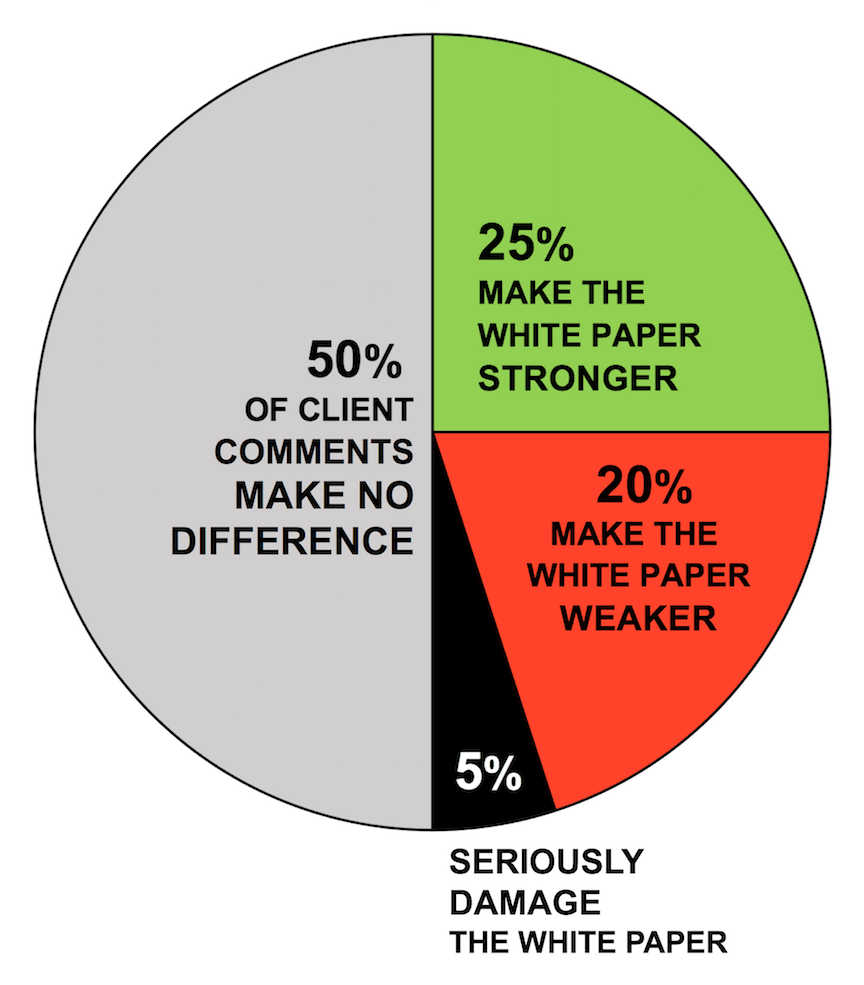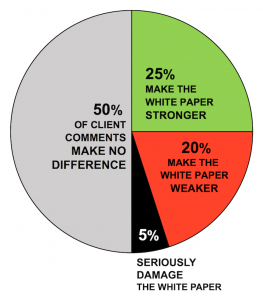
How to handle the 4 types of comments on white papers
Dealing with comments can be challenging. This excellent article from copywriting legend Bob Bly describes how to recognize and handle the different types of comments from clients.
Comments on draft white papers fall into one of four categories.
This is my view after 37 years as a professional copywriter.
During that time, I’ve written white papers and many other types of B2B content and promotions.
And I believe that white paper writers should treat each type of comment a little differently. Here’s how.

1. Comments that make no difference
First, about 50% of revision requests won’t make a difference one way or the other.
These comments don’t affect the clarity or persuasiveness of the white paper, or lessen its ability to build trust and generate revenue.
They are immaterial. They are subjective.
But the client wants them. They make the client happy. And the client is paying.
So I make them cheerfully.
The only discussion I may need is for clarification, or to ask a question if I don’t understand something in the comment.
2. Comments that make the copy stronger
Another 25% of the revisions actually make the white paper stronger.
These revisions either:
- Correct a factual mistake about the product, service or industry
- Suggest a change based on the client’s superior knowledge of her prospects
- Fill in a gap in the white paper’s argument
Of course, I make these revisions happily, and thank the client for them.
3. Comments that make the copy weaker
About 20% of the revisions are comments that—in my opinion—make the text weaker.
But these are not so horrific that they will significantly affect the response to the white paper in any way.
Here’s what I do when I get this kind of request.
I politely explain to the client why I think the change is not beneficial and how it can actually hurt the white paper.
After that, if they disagree with me and still want to make the edit, I do not argue. I acquiesce pleasantly.
I suggest you do likewise.
This is where beginning copywriters can make blunders. Perhaps you argue about making a change, far past the point when you should drop it.
This blows the comment out of all proportion and risks damaging your relationship with the client.
It only takes a few interactions like this for a client to decide you’re hard to work with. Then they’re far less likely to hire you again.
We’ve already seen how 75% of all comments make no difference, or actually improve a white paper. Is arguing about one little comment really worth it?—Ed.
4. Comments that damage the white paper
Finally—in my opinion as a professional copywriter—I believe about 5% of the edits clients ask me to make are in fact going to seriously damage the text or logic of the white paper.
They may introduce a logical fallacy or a contradiction. They may make a claim with no evidence to back it up. They may repeat some marketing-speak that has no place in a white paper.
In any case, I believe these comments will likely render the white paper much less effective.
Remember, this is by far the least common case, applying to only 1 in 20 comments. That’s a tiny sliver of the overall feedback.
Again, I politely explain my views to the client as in #3 above. And if the client still insists on the change, I push back a little more.
In effect, I argue my case—strongly, but not endlessly. And I try not to be obnoxious or offensive in any way.
Then if the client does not change his mind, I reluctantly make the change in a way that satisfies him and if possible minimizes the damage.
For example, there may be a way to insert another phrase or sentence to clarify or qualify the comment.
Our responsibility as copywriters
But there’s one more step. When I submit the revised draft, I state in my cover e-mail that I think the change is a serious error that could reduce or even kill response to the white paper.
Then if someone in the client organization ever comes back to me and says, “That white paper didn’t work!” I can show her that email and how I actually predicted it would not.
I hate having to take this cover-your-ass (CYA) approach, because it doesn’t make anyone happy.
But I do feel a responsibility to give all my clients the best copy possible. And this e-mail shows that I did my best to fulfill that responsibility.
How do you deal with revisions from clients? Have you ever argued too long or too forcefully? What happened? Please leave us your comment below.
Want to hear whenever there’s a fresh article on this site? Subscribe here to stay in the know on long-form content. From time to time, we’ll also send you word about some great new resource or training. And you can unsubscribe any time.





Bob, You must have enormous patience. I particularly liked your approach to comments that a client would make that would damage the white paper. It appears that it would avoid a battle of words with a client and maybe damage the relationship. Also, the CYA comment could prove that you tried to avoid the damage beforehand.
The best Blog For White Paper
I didn’t peek
Thank You for your information.